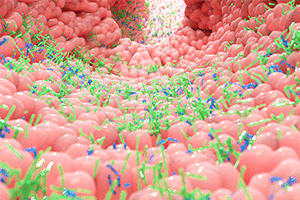
Nov 5, 2021
The microbiome market is on fire. The hype is evident with new companies, investments, big pharma collaborations, and acquisitions. Funding has reached a historic level of close to 2 billion dollars worldwide (2020). Pharma companies such as Takeda, Gilead, DuPont, GSK, Pfizer, and Merck have entered significant collaboration deals with Microbiome biotech companies. This impressive growth comes after a huge leap in basic research. In 2020 alone, there were over 20,000 different publications around the microbiome therapeutic space.
Two decades ago, the properties of the microbiome were considered a black box. The rapid advancements in DNA-sequencing methods, big-data and computational biology have driven research in the field. Researchers have been increasingly linking the microbiome composition and activity with human diseases, including diseases with poorly understood mechanisms and high medical unmet needs. Specifically, the gut microbiome was found to have a critical role in multiple physiological processes such as producing metabolites that regulate immune responses, blocking infections by pathogenic bacteria, generating vitamins, energy, and more. Most of the clinical attention focuses on the association with a dysbiotic (imbalanced) gut microbiota. Dysbiosis has already been associated with bacterial infections, Cancer, inflammatory bowel disease (IBD), irritable bowel syndrome (IBS), obesity, non-alcoholic fatty liver disease, allergies, depression, and much more. Evidently, with a 12% annual growth in registered patents, and dozens of microbiome-associated clinical trials being conducted, companies are translating the knowledge gained by basic research into developing new and innovative products.
Currently, dozens of companies exist in the microbiome landscape, most of them are looking to modulate the composition and function of patient’s microbiome using different strategies:
Live Biotherapeutic Products (LBP)
Recently defined by the FDA, LBP is a class of biological products that contain live organisms and are applicable to prevent, treat or cure a specific disease. The development of LBPs is based on a comparison of microbiome composition taken from healthy and dysbiotic patients. The developers are looking for a specific commensal strain that might have a therapeutic effect on a certain disease. Additionally, LBP therapy can include genetically modified bacteria that serve as a living production system of beneficial molecules.
FMT
Fecal Microbiota Transplantation (FMT) is a procedure in which a liquid mixture of a donor’s fecal matter is administered into the intestinal tract of a recipient. The success of FMT in treating Clostridium difficile, and a good short-term safety record, have encouraged scientists to study FMT as a potential therapy for other gut dysbiosis-associated diseases. Clinical trials in IBS, Hepatic Encephalopathy, Crohn’s disease, Primary Sclerosing Cholangitis, and Autism have already been published. However, efficacy and safety data for these conditions is still limited and further study is needed before patients will see any FMT therapy outside of clinical trials.
The main technological challenge in both strategies is reaching effective and long-lasting colonization of the therapeutic bacteria after administration, as the commensal bacteria are actively blocking new incoming bacteria from colonizing and stealing their precious gut-land.
Phage therapy
Phages are natural predators of bacteria and are considered inert to mammalian cells. As most viruses in nature, phages are highly specific to their host, and just like a key to a keyhole, they bind their host and subsequently inject their viral genome.
Using tools of molecular and synthetic biology, scientists are developing phage-based therapeutics to specifically kill/deliver an engineered genomic payload to the targeted bacteria that is harboring the patient’s microbiome, without disrupting other neighboring, potentially beneficial, commensal bacteria. (Read more on “Bacteriophages: A Promising Therapeutic Tool”).
It is now clear that the future of precision medicine will include technologies that address the impact of the human microbiome on disease development.